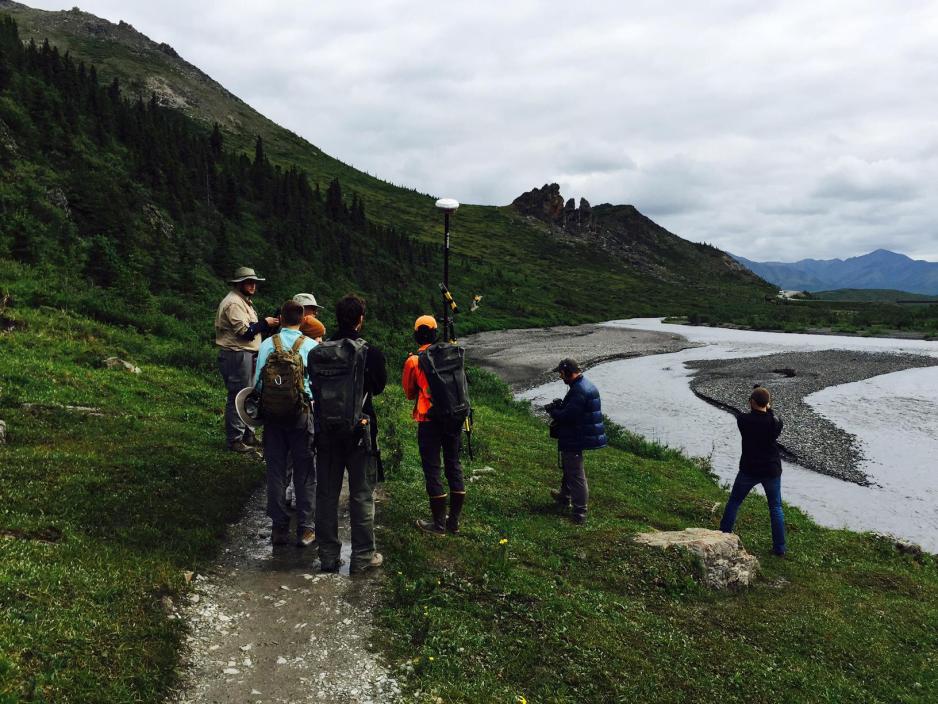Using Arctic Soils for Climate Change Action

In an era where science is undermined by America’s national leaders, a soil scientist, a group of students, and a film crew travel to Alaska to show why Americans must act on climate change.
For over 25 years, Dr. Chien Lu Ping inspired young scientists through his field tour for students on Arctic soils through the University of Alaska Fairbanks. Students from across America – and the Arctic – received a hands-on experience of excavating and sampling permafrost-affected soils and diagnosing soil morphological properties.
Now in his 70s, Dr. Ping has retired – but not before a small film crew documented his final effort to teach a generation how to analyze Arctic soils to learn more about the rapidly changing world around us all.
But what began as a film to document one man’s extensive field experience became an internationally shown documentary about so much more than soil.
What Happens in Alaska Doesn’t Stay in Alaska
Between Earth and Sky is an enthralling visual voyage into climate change by way of Arctic soil, receding glaciers, and native Alaskans. Seamlessly weaving together interviews with some of the world’s leading scientists in climate change and Arctic soils with the day to day struggle of Native Alaskans living, Between Earth and Sky paints a picture of why, how, and to what end America’s northernmost landscapes are transforming in the early years of the 21st Century – to "show the calamity of climate change that has started in Alaska but will soon engulf the globe."
At the heart of this project is David Weindorf, an Executive Producer of the film and an Associate Dean of Research at the College of Agricultural Sciences and Natural Resources at Texas Tech University. For many years, Dr. Weindorf brought his students to Alaska for Dr. Ping’s field tour. It was this experience that motivated Dr. Weindorf to produce the film, but his takeaway message moves beyond an homage to a fellow colleague.
When asked what viewers should learn about his film, Dr. Weindorf thinks of the big picture of a changing climate and our individual role in that change.
"The aggregated efforts of millions of individuals across the world makes a meaningful impact in curtailing energy demand. We should all aspire to touch the land lightly for the benefit of future generations."
A Life Altering Experience of Filming Alaska
That aim has resonated with many at home and abroad.
"In introducing our film in Colorado, the founder of the festival said this is the most important film about Alaska he has seen in a Decade!" Director Paul Allen Hunton has also seen the film’s success with audiences.
"The film has received a very strong reception from audiences. The DCEFF (DC Environmental Film Festival) screening was a full house and we filled the overflow room. In Colorado audience members said it was life altering and that they wanted to make a difference and an impact because of the film."
It is not just that Director Hunton has seen the film impact viewers – the experience has also changed him as a director, as an America, and as a human being.
"The experience was life altering, Alaska is one of the last places on earth where you can get a true sense of wilderness. While we feel pretty spread out here in the Southwestern continental US, Alaska feels like another world. There were definite challenges, the terrain, the weather, the wildlife, but overall seeing the impacts of climate change in real time, up close and personal, is an experience that will remain with me for the rest of my life."
Climate Change as a Political Ideology
The Trump Administration’s view on climate change mitigation and adaptation stands in stark opposition to the film’s subject and call to action.
In its visual narrative, Between Earth and Sky pleas for its viewers to care for both the Earth’s fragile ecosystem through reducing our footprint on this planet and to care for those already experiencing some of the worst effects of climate change – neither of which are taken seriously by the current American president.
Dr. Weindorf is not shy about his disapproval of the Administration’s actions on climate change two months into their tenure.
"Just (last) week, numerous carbon emissions controls were scrapped by the Trump Administration, a clear signal that they value traditional energy production – e.g. coal, oil, and natural gas, compared to alternative clean energies such as wind, solar, and tidal currents. The new Chief of the EPA is no record as denying that humans have had an impact on global climate change. To be clear, these positions are politically charged and underwritten by the coffers of industry, who (care) chiefly about quick profit rather than long term damage to our plant. They also stand in stark contrast to the 97 percent of reputable scientists the world over who have acknowledged the impacts humans are having on global climate change."
We Need to Start Changing Our Lifestyles
Mr. Hunton agrees. "Unfortunately the issue of climate change has become hyper-politicized," Mr. Hunton regretfully acknowledges. "The policies enacted by the current administration would actually make this film an impossibility because one of the grants we received would no longer be available due to changes this administration made on projects it grants funds to."
Still, the message from the film and its Director are clear – and perhaps even more impactful in the face of an unwilling climate change leader. "We cannot wait until climate change affects us personally," says Mr. Hunton, "we need to start changing our lifestyles, our energy consumption and energy sources immediately for the benefit of those in Alaska and everywhere else around the world that are being impacted by climate change."
